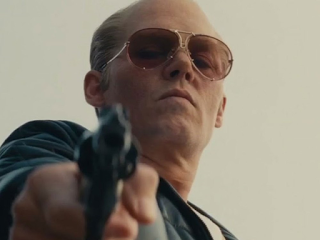 Whitey Bulger's Boston criminal empire, alliance with the FBI, decades-long disappearance and dramatic arrest are tailor-made for Hollywood. Based on Dick Lehr and Gerard O'Neill's book, Scott Cooper's Black Mass (2015) is disappointingly adequate. Despite an impressive Johnny Depp performance, the film's by-the-numbers gangster shtick fails to impress.
Whitey Bulger's Boston criminal empire, alliance with the FBI, decades-long disappearance and dramatic arrest are tailor-made for Hollywood. Based on Dick Lehr and Gerard O'Neill's book, Scott Cooper's Black Mass (2015) is disappointingly adequate. Despite an impressive Johnny Depp performance, the film's by-the-numbers gangster shtick fails to impress.James "Whitey" Bulger (Johnny Depp) controls South Boston's Winter Hill Gang in the 1970s. He's contacted by John Connolly (Joel Edgerton), childhood friend-turned-FBI agent, who asks Bulger to inform on his Italian-American rivals. Whitey abuses his informant status, expanding his empire at his rivals' expense with Connolly shielding his actions. Eventually, Whitey's actions grow too violent even for his connections to protect him.
Filmgoers know Whitey Bulger as the inspiration for Martin Scorsese's The Departed (2007), a romanticization Black Mass avoids. Unlike Jack Nicholson's flamboyant faux-Bulger, this Whitey is a teetotaling family man with a thuggish streak. He murders rivals, strangles a prostitute (Juno Temple) and threatens Connolly's wife (Julianne Nicholson) to downplay sympathy. Writers Jez Butterworth and Mark Mallouk show Whitey devastated by his son's death, which humanizes the gangster without softening him. This is a nice touch in an otherwise formulaic film.
Based on a true story or not, Whitey's failure is Hollywood predictable. Like all movie gangsters he overreaches, not content with ruling Southie but attempting an empire. He's involved in a murky deal with a jai-alai league and ships arms to the Provisional IRA, which expose him to international scrutiny. His increased recklessness drives informers to the Feds; Cooper's most regrettable device is a flashback structure of Whitey's henchmen testifying against him. Whitey's decades on the lam could generate a film of its own, but Cooper gives it only an offhand epilogue.
What's really unsettling about Black Mass isn't the gangland violence but institutional failures that enable him. It only takes one crmid-level FBI agent to shield Bulger for decades, even after his information proves dubious. Connolly's more lucky than clever; when his boss (Kevin Bacon) turns against him, a wiretap nails Whitey's Italian rival. But the filmmakers never elucidate Connolly's muddled motives. Some scenes suggest an honest cop who can't see past misplaced loyalty, others an ambitious crook; Black Mass can't square the two.
Besides a commendable physical transformation, Johnny Depp channels an intensity he hasn't shown in decades. Steely, calculating and unpredictably violent, Depp's Bulger is an intimidating force without a shred of likeability. Joel Edgerton makes a good counterpart, selling Connolly's cockiness and misplaced loyalty.
Benedict Cumberbatch plays well against-type as Billy Bulger, a square State Senator who ignores his brother's criminality. Kevin Bacon and Corey Stoll get meaty character roles as Connolly's bosses; Dakota Johnson and Julianne Nicholson scream and cower as token females. Juno Temple and Peter Sarsgaard have scene-stealing cameos as two of Whitey's victims.
Black Mass is a good story, adequately told. While Cooper avoids romanticizing Bulger, he also fails to make him truly compelling. The handful of clever touches only exacerbate the film's overall predictability.

